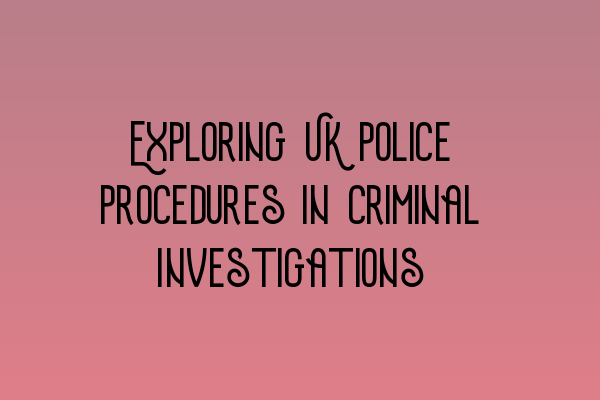Exploring UK Police Procedures in Criminal Investigations
Welcome to the SQE Criminal Law & Practice Law UK blog, where we delve into various aspects of criminal law. In this post, we will explore the intricacies of UK police procedures in criminal investigations. Understanding police procedures is essential for anyone pursuing a career in criminal law or preparing for the SQE exams.
Role of the Police in Criminal Investigations
The police play a crucial role in the criminal justice system. They are responsible for ensuring public safety, maintaining law and order, and investigating criminal offenses. The procedures followed by the police during criminal investigations are designed to gather evidence, identify suspects, and build a solid case.
When a crime is reported, the police initiate an investigation to uncover the truth. This may involve conducting interviews, collecting physical evidence, and analyzing forensic materials. The police also work closely with other relevant agencies, such as forensic laboratories and legal professionals, to ensure a comprehensive investigation.
Arrest and Detention
If the police have reasonable grounds to believe that an individual has committed a crime, they have the power to arrest and detain that person for questioning. However, this must be done in accordance with the law and with respect for the individual’s rights.
During the arrest process, the police must inform the individual of their rights, including the right to remain silent and the right to legal representation. It is important for individuals to be aware of these rights and exercise them effectively to protect their interests.
To learn more about arrest and detention procedures in the UK, check out our article on SQE 1 Practice Exam Questions.
Evidence Collection and Preservation
Collecting and preserving evidence is a critical part of any criminal investigation. The police are responsible for identifying, documenting, and securing evidence that may be relevant to the case.
This can include physical evidence such as fingerprints, DNA samples, and weapons, as well as documentary evidence such as witness statements and CCTV footage. Proper handling and storage of evidence is vital to ensure its admissibility in court.
For more insights into evidence collection and preservation, we recommend reading our article on SQE 1 Practice Mocks FLK1 FLK2.
Police Interviews
During a criminal investigation, the police may conduct interviews with suspects, witnesses, and victims. These interviews are designed to gather information and establish the facts surrounding the case.
It is crucial for interviewees to understand their rights and obligations during police interviews. Legal representation can greatly assist individuals in effectively navigating the interview process and ensuring their rights are protected.
If you want to enhance your understanding of police interviews, be sure to explore our article on SQE 2 Preparation Courses.
Conclusion
Police procedures in criminal investigations are intricate and play a vital role in ensuring justice is served. Understanding these procedures is crucial for aspiring legal professionals and individuals preparing for the SQE exams.
For comprehensive preparation resources and courses for the SQE exams, visit our website at SQE 1 Preparation Courses and SQE 2 Preparation Courses.
Stay up to date with important SQE exam dates by checking out our article on SRA SQE Exam Dates.
Thank you for reading, and stay tuned for more valuable insights into criminal law and practice!
